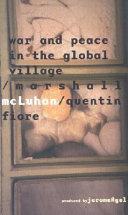Herbert Marshall McLuhan, was a Canadian professor, philosopher, and public intellectual. His work is one of the cornerstones of the study of media theory, as well as having practical applications in the advertising and television industries. He studied at the University of Manitoba and the University of Cambridge; he began his teaching career as a Professor of English at several universities in the U.S. and Canada before moving to the University of Toronto, where he remained for the rest of his life.
McLuhan is known for coining the expression "the medium is the message" and the term global village, and for predicting the World Wide Web almost 30 years before it was invented. He was a fixture in media discourse in the late 1960s, though his influence began to wane in the early 1970s. In the years after his death, he continued to be a controversial figure in academic circles. With the arrival of the Internet and the World Wide Web, however, interest was renewed in his work and perspective.
✵
21. July 1911 – 31. December 1980


